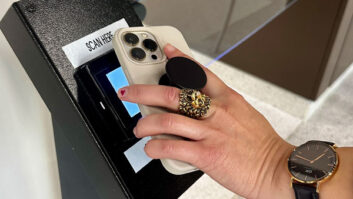Some consumer electronics stores were closed on Sept. 11 and the next day, but consumers gradually came back into the market by the first weekend after the attack. Retailers, who were faced in many cases with a flat sales environment, are anxious to see what the long-term effects on business will be.
On Sept. 11, and in some cases the day after, retailers closed their stores and, when they reopened, experienced slower than normal sales later that week, as the country was home, riveted to the TV trying to find out the latest information on the attack. Manufacturers and retailers opened their pocket books and inventories to aid in the rescue and recovery mission. MARTA closed its buying group meeting the day of the attacks while the Retail Dealers of America cancelled its convention. The industry opened up its purse strings to donate cash and products to rescue and recovery efforts. (See related stories, p. 1.)
And PC and video game suppliers delayed, cancelled or changed release dates of titles that featured terrorism or images of the World Trade Center. (See story, p. 12.)
A spokesperson for Sears said sales were “dismal” on Sept. 11 and some stores were closed on Wednesday nationwide. “By Friday sales picked up, with some strong volume over the weekend. But comp sales were down over the weekend in double digits for the entire chain.” While sales were down in the days and the weekend following the terrorist attack two of the categories that generated the most sales for Sears were consumer electronics and major appliances. CE sales were up, probably due to a strong 0% financing promotion, the spokesperson added.
Best Buy closed 800 Sam Goody stores and 100 Best Buy stores in the effected areas the day of the attack. “Sales improved over the course of the week,” a company spokesperson noted, although were lower than expected. “So far we are pretty much on plan for September, since the first week of the month was strong,” the spokesperson noted. Sales of portable TVs and notebook PCs sold well in areas directly effected by the disaster, the company reported.
In its call with the investment community, where it outlined its quarterly sales report (see p. 1) Circuit City did not want to comment on what was selling in the wake of Sept. 11, but did say its sales pace by the first weekend after the disaster began to rebound.
Frank Sandowski, senior VP/merchandising for online retailer 800.com, said the shut down of all domestic flights hurt his operation. “Packages were deferred in shipping and we worked to get around it. Consumers have been understanding.” Concerning business, Sandowski said, “Web traffic is up with people checking the news, but retail sites have been hurt. While this is a relatively slow time of year under normal circumstances you can understand that under the current circumstances people really wouldn’t want to go shopping.”
Bill Trawick, executive director of the NATM buying group, said early last week, “I’ve been calling members over the last few days. From Tuesday through Thursday sales were soft. People stayed home and watched TV. Still a number of major markets had a decent weekend where people shopped. It was a tough, but a decent weekend. Shopping was something for [consumers] to do to get out of the house. Three of our members had good projection TV sales.”
Warren Mann, executive director of the MARTA Cooperative of America, noted, “Business has been slow [since the attack]. No one came into stores, and now, despite the patriotic fervor… it still seems to be slow. And I’m hearing this in the Midwest and the South, as well as the Northeast. People are not buying new TVs. They are hunkering down [with] the ones they’ve got.”
Deryl Sewell, president/CEO of Retail Dealers of America (RDA), commented, “On Tuesday (Sept. 11) and Wednesday you could have closed up and gone home. Things picked up by Saturday, and [the following] Monday and Tuesday were great both in rural and cosmopolitan areas. The feeling is, yes, we’ve had a major tragedy, but it is time to move on. We need to get back to business.”
Tom Campbell, board member and spokesperson for Los Angeles-based Ken Crane’s said that his chain “pulled all our ads off the air right after the disaster.” It changed its ads from a lighthearted approach to one of describing its home entertainment centers as “two-way communication for your family, to keep up with the news and follow what information is on the Web.” Sales for the weekend following the disaster were down 5 percent, Campbell said.
The closest retailer to the World Trade Center, J&R Music World, remained closed last week. But the shutdown of the store in lower Manhattan’s Park Row was planned prior to the attack due to the Jewish New Year. The chain reiterated that the chain continues to fulfill phone and online orders during the week out of its Queens, N.Y., warehouse and that there is no structural damage to its Park Row store. RadioShack lost a store at the World Trade Center, but reported that all of its store personnel there and in Washington were unharmed.
Fellow New York City metro area retailer The Wiz closed its seven Manhattan stores on Tuesday and Wednesday Sept. 11 and 12, with two stores, one in Brooklyn and the other on Staten Island, closing the day of the attack. The chain cancelled all TV, print and radio ads for the balance of the week, with only its Sunday circulars appearing in local papers on Sunday, Sept. 16. The chain, along with its parent company Cablevision that owns Madison Square Garden and Radio City Music Hall, backed local rescue and recovery efforts.
“We are heartbroken here… it’s hard to keep our mind on business because it happened in our town, and so many of our people have lost relatives,” said Leon Temiz, CEO of New York-area chain 6th Avenue Electronics. His stores closed stores the day of the attack, but reopened the next day “but they weren’t fully staffed.”
Temiz said that sales were down about 45 percent “and it’s still affecting us this week. As members of the PRO Group we share information and it’s the same across the country.” He added that it is tough to know what the after-effects of the attack will be on the industry. “Maybe people won’t travel, stay home and invest in a home theater system. Maybe they’ll wait for big sales to buy. Manufacturers are calling us to get a read on demand.”
Still many take the view of RDA’s Sewell, who said, “We are very positive about the future. Will there be hurtles? Yes. Will there be retail casualties? Yes. Will it be easy? No. Doing business in the U.S. today is not easy, no matter what line you are in. Those dealers, regardless of their size or affiliation, who are promoting and running their businesses, are doing well.”












